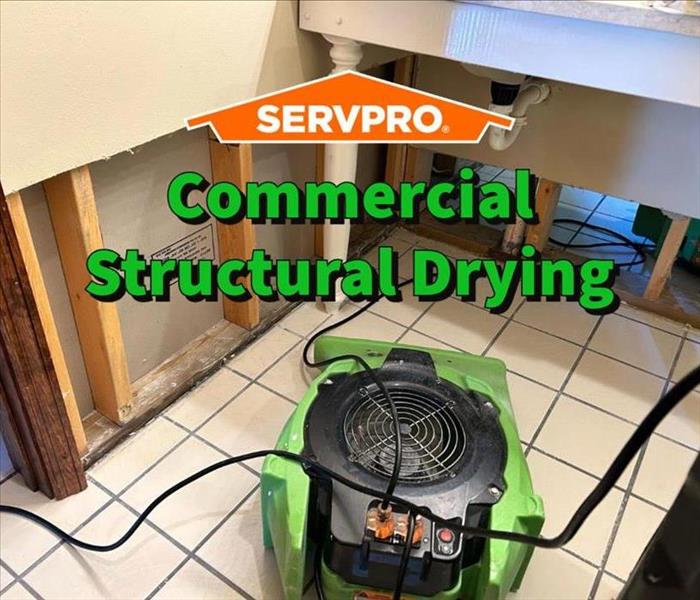Commercial Structural Drying: 7 Steps for Success
12/27/2024 (Permalink)
 The professionals at SERVPRO undergo extensive training to perform high-quality commercial structural drying services!
The professionals at SERVPRO undergo extensive training to perform high-quality commercial structural drying services!
Discover the essentials of commercial structural drying and how SERVPRO® ensures businesses bounce back after water damage.
Water damage can disrupt any business, posing significant risks to operations and property integrity. When disaster strikes, commercial structural drying becomes essential to minimize downtime and prevent further damage.
This blog outlines the critical steps in commercial structural drying, shares expert prevention tips, and highlights SERVPRO's commitment to restoring your property to its preloss condition.
What Is Commercial Structural Drying?
Commercial structural drying is the process of removing moisture from building materials and structural components following water damage. Unlike basic water extraction, this advanced technique targets hidden moisture in walls, floors, and ceilings, preventing long-term damage like warping, mold growth, and compromised structural integrity.
Why Is Structural Drying Essential for Businesses?
For commercial properties, water damage can lead to:
- Operational disruptions
- Costly repairs
- Compromised safety for employees and customers
Acting swiftly with professional structural drying services ensures minimal disruption and preserves the value of your property.
Key Steps in Commercial Structural Drying
Step 1: Initial Assessment and Damage Inspection
Before drying begins, a thorough assessment is conducted to identify the water source and extent of damage. SERVPRO professionals use moisture meters and thermal imaging to detect hidden moisture in structural elements.
Step 2: Water Extraction
Standing water is removed using powerful extraction equipment. This step is crucial for speeding up the drying process and reducing the risk of secondary damage.
Step 3: Airflow Optimization
High-velocity air movers are strategically placed to circulate air across wet surfaces, accelerating evaporation. This step is vital for drying walls, floors, and ceilings.
Step 4: Dehumidification
Industrial-grade dehumidifiers are deployed to reduce humidity levels, preventing moisture from reabsorbing into materials.
Step 5: Moisture Monitoring
SERVPRO experts continuously monitor moisture levels throughout the process to ensure that all affected areas meet drying goals.
Step 6: Specialized Techniques for Complex Areas
Advanced drying techniques, such as injection systems and desiccant dehumidifiers, are utilized for challenging spots like wall cavities and subfloors.
Step 7: Post-Drying Inspection
After drying is complete, a final inspection ensures that all moisture is removed and that the property is safe and ready for use.
Scenario: Commercial Water Damage in Dayton, Ohio
Last month, a business in Dayton, Ohio, faced a severe water damage emergency after a sprinkler system malfunction. The water seeped into walls, flooring, and key operational spaces, threatening significant downtime.
Upon receiving the call, the SERVPRO team responded immediately. The steps taken included:
- Rapid Water Extraction: Standing water was removed within hours using state-of-the-art equipment.
- Targeted Drying: High-velocity air movers and industrial dehumidifiers ensured complete drying of all structural components.
- Moisture Monitoring: Continuous assessments confirmed that all moisture was eliminated, preventing future complications.
Thanks to SERVPRO's swift action, the business was fully operational within three days, showcasing the effectiveness of professional structural drying.
Prevention Tips for Commercial Water Damage
While SERVPRO is ready to help, proactive measures can minimize water damage risks:
- Regular Inspections: Check plumbing, sprinkler systems, and roofing for vulnerabilities.
- Seal Vulnerable Areas: Ensure windows, doors, and foundation cracks are properly sealed to prevent water intrusion.
- Elevate Critical Equipment: Place essential machinery and inventory on elevated platforms to reduce exposure during flooding.
- Smart Monitoring Systems: Install water detection devices to identify leaks before they escalate.
- Routine Maintenance: Schedule periodic HVAC and drainage system inspections to prevent malfunctions.
Why Choose SERVPRO for Commercial Structural Drying?
SERVPRO stands out for its:
- 24/7 Emergency Response: We're ready to respond at a moment's notice.
- Advanced Technology: We use cutting-edge tools from thermal imaging to industrial-grade drying equipment.
- Skilled Professionals: Our team is trained to handle even the most complex commercial drying scenarios.
- Comprehensive Services: Beyond drying, we offer cleaning, deodorization, and full restoration.
Wrapping Up
Water damage doesn't have to derail your business. With commercial structural drying services from SERVPRO, you can ensure a swift and effective recovery. Whether you're facing a burst pipe, storm flooding, or sprinkler malfunction, trust SERVPRO to restore your property and peace of mind. SERVPRO is your partner in navigating water damage challenges for businesses in Dayton, Ohio, and beyond. Contact us today to learn how we can help protect your commercial property from unexpected disasters.



 24/7 Emergency Service
24/7 Emergency Service